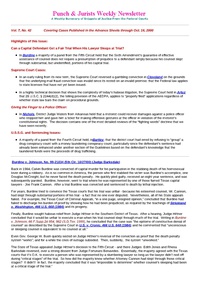Warning against “a sweeping expansion” of Federal criminal jurisdiction, the Supreme Court vacated the mail fraud convictions of a Louisiana lawyer (which had also served as the predicates for his money laundering and racketeering charges) on the grounds that the Federal statute, 18 U.S.C. § 1341, does not reach …
This is one of those habeas corpus decisions that proves the obvious: Through complex, complicated and obfuscated statutes, Congress has succeeded in turning the Great Writ into a procedural playground that defies human comprehension. In 1994, Congress enacted the AEDPA in part limit habeas appeals. One of the provisions …
Here, over the dissent of Judge Wilkinson, the Court held that to prevent double counting the same offense conduct the district court erred by not grouping the defendant's money laundering charges with his drug conspiracy charges under USSG § 3D1.2(c).
Money laundering charges continue to proliferate in an …
In this case, while he was serving a term of supervised release for a prior Federal offense, the defendant was arrested by New Jersey state police for possession of cocaine. The date of his arrest was May 27, 1994. The defendant pled guilty to the charge and was sentenced …
Here the Court held that a sentencing court may consider the rehabilitative needs of a defendant when imposing or determining the length of a term of imprisonment upon mandatory or permissive revocation of supervised release.
Here the Court affirmed the use of the so-called "fencing enhancement" under USSG § 2B1.1(b)(4)(B) - for being in the business of receiving and selling stolen property - even where the business also sold many legitimate and lawful products.
In this case, the defendants argued that the district …
In this case the plaintiff recovered $1.00 in nominal damages from a prison guard who locked plaintiff in a restaining chair and covered his mouth with a towel until he lost consciousness. The district court then awarded the plaintiff some $3,892 in legal fees - contending that the PLRA's …
Here the Court held that a police detective was not entitled to a defense of qualified immunity in a civil rights action for damages based on his improper search of the plaintiff's confidential drug treatment records.
The plaintiff in this case brought a civil rights action against Detective …
Here the Court held that a district court's understatement of the mimumum mandatory sentence at the plea colloquy violated the provisions of Rule 11(c)(1), rendered the plea involuntary, and affected the defemndant's substantial rights.
In this case the First Circuit held that a district court's understatement of the …
Here the Court joined the rule adopted by the 3rd and 5th Circuits that a district court lacks jurisdiction to order damages on a motion for return of destroyed property pursuant to Fed.R.Crim.P. 41(e) - based on the principle of sovereign immunity.
In this case the defendant sought …
This rather widely-publicized case is noted for its detailed discussion of the “fighting words” doctrine - under which provocative and challenging speech and gestures - even when directed against the police - are protected under the First Amendment against censorship and punishment - unless they are deemed to be …
Back in 1984, Calvin Burdine was convicted of capital murder for his participation in the stabbing death of his homosexual lover during a robbery. As is so common in America, the person who first stabbed the victim was Burdine’s accomplice, one Douglas McCreight, but he never faced the death …
